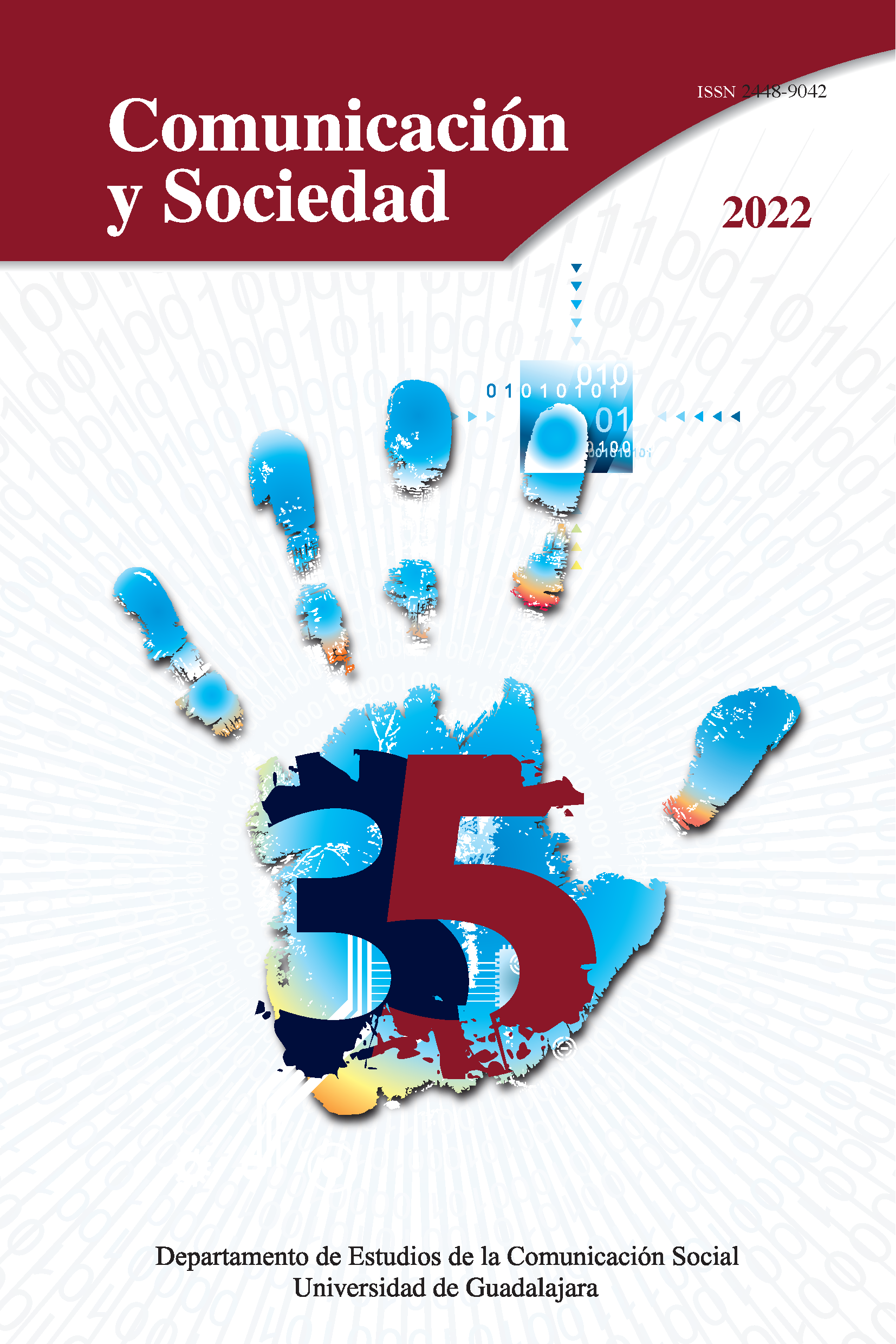Political engagement or disaffection? The impact of partisan dealignment and cognitive mobilization on Mexicans’ political attitudes in the 2018 presidential campaign
DOI:
https://doi.org/10.32870/cys.v2022.8220Keywords:
Cognitive mobilization, Partisan dealignment, Political engagement, Political disaffection, Election campaignsAbstract
Political engagement and disaffection patterns are analyzed among four relevant groups of citizens based on their levels of partisanship and cognitive mobilization. The results reveal significant differences between groups, with those with a higher degree of cognitive mobilization (cognitive partisans and apartisans) exhibiting superior levels of internal political efficacy and less political apathy than groups with low values on this variable (ritual partisans and apoliticals).Downloads
References
Austin, E. W. & Pinkleton, B. E. (1995). Positive and negative effects of political disaffection on the less experienced voter. Journal of Broadcasting & Electronic Media, 39, 215-235. https://doi.org/10.1080/08838159509364300
Austin, E. W. & Pinkleton, B. E. (1999). The relation between media content evaluations and political disaffection. Mass Communication & Society, 2(3/4), 105-122. https://doi.org/10.1080/15205436.1999.9677867
Balch, G. I. (1974). Multiple Indicators in Survey Research: The Concept “Sense of Political Efficacy”. Political Methodology, 1(2), 1-43. https://www.jstor.org/stable/25791375
Bennett, S. E. (1986). Apathy in America, 1960-1984: Causes and consequences of citizen political indifference. Transnational Publishers.
Buendía, J. & Somuano Ventura, M. F. (2003). Participación electoral en nuevas democracias: la elección presidencial de 2000 en México. Política y Gobierno, X(2), 289-323. http://www.politicaygobierno.cide.edu/index.php/pyg/article/view/342
Campbell, A., Gurin, G. & Miller, W. E. (1954). The Voter Decides. Row and Peterson.
Campbell, A., Converse, P. E., Miller, W. E. & Stokes, D. E. (1960). The American Voter. John Wiley.
Cappella, J. N. & Jamieson, K. H. (1997). Cynicism or realism? En Spiral of cynicism: The press and the public good (pp. 17-37). Oxford University Press.
Converse, P. E. (1972). Change in the American Electorate. En A. Campbell & P. E. Converse (Eds.), The Human Meaning of Social Change (pp. 263-337). Russell Sage Foundation.
Cisneros, I. (2020). Independencia partidista en América Latina: Actitudes, comportamiento y decisión de voto. Latin American Research Review, 55(4), 706-726. http://doi.org/10.25222/larr.457
Craig, S. C., Niemi, R. G. & Silver, G. E. (1990). Political Efficacy and Trust: A Report on the NES Pilot Study Items. Political Behavior, 12(3), 289-314. https://doi.org/10.1007/BF00992337
Crotty, W. J. & Jacobson, G. C. (1980). Television and the politics of media. En American Parties in Decline (pp. 67-99). Brown, Little and Company.
Dalton, R. J. (1984). Cognitive Mobilization and Partisan Dealignment in Advanced Industrial Democracies. The Journal of Politics, 46(1), 264-284. https://doi.org/10.2307/2130444
Dalton, R. J. (2000a). Citizen attitudes and political behavior. Comparative Political Studies, 33(6-7), 912-940. https://doi.org/10.1177%2F001041400003300609
Dalton, R. J. (2000b). The Decline of Party Identifications. En R. J. Dalton & M. P. Wattenberg (Eds.), Parties without Partisans: Political Change in Advanced Industrial Democracies (pp. 19-36). Oxford University Press.
Dalton, R. J. (2012). Apartisans and the Changing German Electorate. Electoral Studies, 31(1), 35-45. https://doi.org/10.1016/j.electstud.2011.06.005
Dalton, R. J. (2013). The Apartisan American: Dealignment and Changing Electoral Politics. CQ Press.
Dalton, R. J. (2020). Citizen Politics: Public Opinion and Political Parties in Advanced Industrial Democracies (7a ed.). CQ Press.
Dalton, R. J., McAllister, I. & Wattenberg, M. P. (2000). The Consequences of Partisan Dealignment. En R. J. Dalton & M. P. Wattenberg (Eds.), Parties without Partisans: Political Change in Advanced Industrial Democracies (pp. 37-63). Oxford University Press.
Dalton, R. J. & Wattenberg, M. P. (Eds.). (2000). Parties without Partisans: Political Change in Advanced Industrial Democracies. Oxford University Press
De Vreese, C. H. (2005). The Spiral of Cynicism Reconsidered. European Journal of Communication, 20(3), 283-301. https://doi.org/10.1177%2F0267323105055259
De Vreese, C. H. & Semetko, H. A. (2002). Cynical and engaged. Strategic campaign coverage, public opinion, and mobilization in a referendum. Communication Research, 29, 615-641. https://doi.org/10.1177%2F009365002237829
Delli Carpini, M. X. (2004). Mediating Democratic Engagement: The Impact of Communications on Citizens’ Involvement in Political and Civic Life. En L. L. Kaid (Ed.), Handbook of Political Communication Research (pp. 395-434). Lawrence Erlbaum Associates.
Díaz Jiménez, O. F. (2017). Las campañas electorales, los medios y su impacto en el compromiso cívico de los mexicanos en la elección presidencial de 2012. Comunicación y Sociedad, (29), 139-164. https://doi.org/10.32870/cys.v0i29.6302
Díaz Jiménez, O. F. (2019). El Sistema de Partidos Mexicano después de la Elección Crítica de 2018. Desalineamiento, Cartelización y Desinstitucionalización. Estudios sobre las Culturas Contemporáneas, Número Especial, (V), 33-71. https://bit.ly/3oW9Vcg
Díaz Jiménez, O. F. & Muñiz, C. (2017). Los efectos de la comunicación política en el compromiso político de los jóvenes en la elección presidencial mexicana de 2012. Revista Mexicana de Ciencias Políticas y Sociales, 62(229), 181-221. http://dx.doi.org/10.1016/S0185-1918(17)30008-9
Donovan, T. (2017). Cognitive Mobilization. En K. Arzheimer, J. Evans & M. S. Lewis-Beck (Eds.), The Sage Handbook of Electoral Behaviour (pp. 313-335). Sage.
Eveland, W. P. & Morey, A. C. (2011). Challenges and Opportunities of Panel Designs. En E. P. Bucy & R. L. Holbert (Eds.), Sourcebook for Political Communication Research: Methods, Measures, and Analytical Techniques (pp. 19-33). Routledge.
Gimenes, É. R. & Borba, J. (2017). Apartidarismo e adesão à democracia na América Latina. Revista Latinoamericana de Opinión Pública, 7(7), 63-97. https://doi.org/10.14201/rlop.22331
Greene, K. F. (2015). Campaign effects in Mexico since democratization. En J. I. Domínguez, K. F. Greene, C. H. Lawson & A. Moreno (Eds.), Mexico’s evolving democracy: a comparative study of the 2012 elections (pp. 128-152). Johns Hopkins University Press.
Gunther, R. & Montero, J. R. (2006). The Multidimensionality of Political Support: Conceptual Redefinition and Empirical Refinement. En M. Torcal & J. R. Montero (Eds.), Political Disaffection in Contemporary Democracies: Social Capital, Institutions, and Politics (pp. 46-78). Routledge.
Gunther, R., Costa Lobo, M., Bellucci, P. & Lisi, M. (2016). The changing determinants of the vote. En R. Gunther, P. A. Beck, P. Magalhães & A. Moreno (Eds.), Voting in Old and New Democracies (pp. 150-192). Routledge.
Gunther, R., Montero, J. R. & Torcal, M. (2007). Democracy and Intermediation: Some Attitudinal and Behavioural Dimensions. En R. Gunther, H.-J. Puhle & J. R. Montero (Eds.), Democracy, Intermediation, and Voting on Four Continents (pp. 29-74). Oxford University Press.
Iyengard, S. & Vavreck, L. (2012). Online Panels and the Future of Political Communication Research. En H. A. Semetko & M. Scammell (Eds.), The Sage Handbook of Political Communication (pp. 225-240). Sage.
Klar, S. & Krupnikov, Y. (2016). Independent Politics: How American Disdain for Parties Leads to Political Inaction. Cambridge University Press.
Lupu, N. (2015). Partisanship in Latin America. En R. E. Carlin, M. M. Singer & E. J. Zechmeister (Eds.), The Latin American Voter: Pursuing, Representation and Accountability in Challeging Contexts (pp. 226-245). University of Michigan Press.
Mair, P. (2013). Ruling The Void: The Hollowing of Western Democracy. Verso Books.
Mair, P., Müller, W. C. & Plasser, F. (Eds.). (2004). Political Parties and Electoral Change: Party Responses to Electoral Markets. Sage.
Maldonado Hernández, G. (2013). Desapego político y desafección institucional en México: ¿desafíos para la calidad de la democracia? Política y Gobierno, Desafíos de la política mexicana, (Temático), 109-138. http://www.politicaygobierno.cide.edu/index.php/pyg/article/view/1053
Meixueiro, G. (2014). Los Electores Independientes en México en 2006 y 2012. En G. Meixueiro & A. Moreno (Eds.), El Comportamiento Electoral Mexicano en las Elecciones de 2012 (pp. 141-171). Centro de Estudios Sociales y de Opinión Pública/Cámara de Diputados.
Moreno, A. (2009). La Decisión Electoral: Votantes, Partidos y Democracia en México. Miguel Ángel Porrúa.
Moreno, A. (2012). Who Is the Mexican Voter? En R. A. Camp (Comp.), The Oxford Handbook of Mexican Politics (pp. 571-595). Oxford University Press.
Moreno, A. (2018). El cambio electoral: votantes, encuestas y democracia en México. Fondo de Cultura Económica.
Moy, P. & Hussain, M. M. (2011). Media Influences on Political Trust and Engagement. En G. C. Edwards III, L. R. Jacobs & R. Y. Shapiro (Eds.), The Oxford Handbook of American Public Opinion and the Media (pp. 220-250). Oxford University Press.
Muñiz, C. (2019). Prácticas comunicativas y desafección política en el contexto de las campañas electorales. Análisis de su relación desde el modelo O-S-R-O-R. Index. Comunicación, 9(1), 80-107. https://doi.org/10.33732/ixc/09/01Practi
Nadeau, R., Lewis-Beck, M. S. & Turgeon, M. & Gélineu, F. (2017). Latin American Elections Choice and Change. University of Michigan Press.
Norris, P. (2000a). The impact of television on civic malaise. En S. J. Pharr & R. D. Putnam (Eds.), Disaffected democracies: What's troubling the trilateral countries? (pp. 231-252). Princeton University Press.
Norris, P. (2000b). A virtuous circle: Political communications in postindustrial societies. Cambridge University Press.
Ortega Ortiz, R. Y., Somuano Ventura, M. F. & Ruiz Pérez, A. (2011). Identidad partidista y democracia en los estados mexicanos. En S. Martí i Puig, R. Y. Ortega Ortiz & M. F. Somuano Ventura (Eds.), La democracia en México: un análisis a 10 años de la alternancia (pp. 97-134). Edicions Bellaterra.
Pinkleton, B. E. & Austin, E. W. (2001). Individual motivations, perceived media importance, and political disaffection. Political Communication, 18(3), 321-334. https://doi.org/10.1080/10584600152400365
Pinkleton, B. E. & Austin, E. W. (2004). Media perceptions and public affairs apathy in the politically inexperienced. Mass Communication & Society, 7(3), 319-337. https://doi.org/10.1207/s15327825mcs0703_4
Putnam, R. D. (1993). Making Democracy Work: Civic Traditions in Modern Italy. Princeton University Press.
Somuano Ventura, M. F. (2014). Las identidades partidistas de los mexicanos y la elección de 2012. En G. M. & Alejandro Moreno (Eds.), El comportamiento electoral mexicano en las elecciones de 2012 (pp. 117-140). Centro de Estudios Sociales y de Opinión Pública/ Cámara de Diputados.
Somuano Ventura, M. F. & Ortega Ortiz, R. Y. (2003). La identificación partidista de los mexicanos y el cambio electoral, 1994-2000. Foro Internacional, 171, 10-38. https://forointernacional.colmex.mx/index.php/fi/article/view/1675
Temkin Yedwab, B. & Flores-Ivich, G. (2014). Exposición a Medios de Comunicación y Participación Electoral. En G. Meixueiro & A. Moreno (Eds.), El Comportamiento Electoral Mexicano en las Elecciones de 2012 (pp. 265-281). Centro de Estudios Sociales y de Opinión Pública/Cámara de Diputados.
Temkin Yedwab, B., Solano, S. & del Tronco, J. (2008). Explorando el “apartidismo” en México: ¿apartidistas o apolíticos?”. América Latina Hoy, 50,119-145. https://doi.org/10.14201/alh.1344
Torcal, M. (2003). Political Disaffection and Democratization History in New Democracies. Kellogg Working Paper Series, 308. University of Notre Dame.
Torcal, M. & Montero, J. R. (2006). Political disaffection in comparative perspective. En M. Torcal & J. R. Montero (Eds.), Political Disaffection in Contemporary Democracies. Social Capital, Institutions, and Politics (pp. 3-19). Routledge.
Verba, S., Burns, N. & Schlozman, K. L. (1997). Knowing and Caring about Politics: Gender and Political Engagement. The Journal of Politics, 59(4), 1051-1072. https://doi.org/10.2307/2998592
Weisberg, H. & Greene, S. (2003). The Political Psychology of Party Identification. En M. MacKuen & G. Rabinowitz (Eds.), Electoral Democracy (pp. 83-124). University of Michigan Press.
Yamamoto, M. & Kushin, M. J. (2014). More harm than good? Online media use and political disaffection among college students in the 2008 election. Journal of Computer-Mediated Communication, 19(3), 430-445. http://doi.org/10.1111/jcc4.12046
Yamamoto, M., Kushin, M. J. & Dalisay, F. (2013). Social Media and Mobiles as Political Mobilization Forces for Young Adults: Examining the Moderating Role of Online Political Expression in Political Participation. New Media & Society, 17(6), 880-898. https://doi.org/10.1177%2F1461444813518390
Zmerli, S., Newton, K. & Montero, J. R. (2007). Trust in People, Confidence in Political Institutions, and Satisfaction with Democracy. En J. W. Van Deth, J. R. Montero & A. Westholm (Eds.), Citizenship and Involvement in European Democracies: A Comparative Analysis (pp. 35-65). Routledge.
Downloads
Published
How to Cite
Issue
Section
License
Copyright (c) 2022 Oniel Francisco Díaz Jiménez

This work is licensed under a Creative Commons Attribution-NonCommercial 4.0 International License.
The authors who publish in this journal accept the following conditions:
In accordance with copyright laws, the authors retain the authorship rights and grant Comunicación y Sociedad the right of first public communication of the work. Comunicación y Sociedad does not charge the authors for submitting and processing articles for publication.
The authors can enter into independent and additional contractual agreements for the nonexclusive distribution of the version of the article published in Comunicación y Sociedad (for example include it into an institutional repository or publish it in a book) as long as it is clearly indicated that the work was published for the first time in Comunicación y Sociedad.











